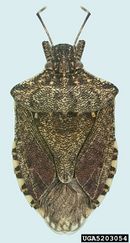Journal of Integrated Pest Management (2020) 11 (1 - pmaa001)
From Pestinfo-Wiki
 | Selected publication you are invited to contribute to the discussion section (above tab) |
Invasion of the brown marmorated stink bug (Hemiptera: Pentatomidae) into the United States: developing a national response to an invasive species crisis through collaborative research and outreach efforts
Journal of Integrated Pest Management 11 (1 - pmaa001)
Abstract: Halyomorpha halys (Stål), the brown marmorated stink bug, is a globally invasive stink bug species. Its first major outbreak was in the United States, where it has caused millions of dollars in damage, threatened livelihoods of specialty crop growers and impacted row crop growers, and become an extreme nuisance pest in and around dwellings. The BMSB IPM Working Group, funded by the Northeastern IPM Center, was central to providing a mechanism to form a multidisciplinary team and develop initial and subsequent research, Extension, regulatory and consumer priorities. Ultimately, a project team consisting of over 50 scientists from 11 institutions in 10 states obtained the largest ever USDA-NIFA Specialty Crop Research Initiative CAP grant, totaling over $10.7 million, to tackle this crisis over a 5-yr period (2011–2016). Researchers and Extension educators integrated stakeholder feedback throughout the course of the project, and priorities evolved according to needs of affected growers and public stakeholders. Initially, the team focused on identification of H. halys, its damage symptoms and crop-specific risks, and short-term mitigation strategies for crop protection. Subsequently, work focused on its biology, ecology, and behavior leading to the development of potential longer-term IPM tactics and landscape level management solutions, including biological control. This work continues under a second SCRI CAP grant (2016–2021). The information from the initial team reached an estimated 22,000 specialty crop stakeholder contacts via Extension efforts, and over 600 million people via mainstream media. We highlight the main lessons learned from coordinating a national response to the threat posed by H. halys to agriculture in the United States.
(The abstract is excluded from the Creative Commons licence and has been copied with permission by the publisher.)
Full text of article
Database assignments for author(s): Angelita L. Acebes-Doria, Arthur M. Agnello, J. Chris Bergh, Matthew L. Buffington, George C. Hamilton, Kim A. Hoelmer, Thomas P. Kuhar, Kevin B. Rice, Cesar R. Rodriguez-Saona, Peter W. Shearer, Paula M. Shrewsbury, James F. Walgenbach, Nik G. Wiman, Tracy C. Leskey
Research topic(s) for pests/diseases/weeds:
control - general
review
Pest and/or beneficial records:
| Beneficial | Pest/Disease/Weed | Crop/Product | Country | Quarant. |
|---|---|---|---|---|
| Halyomorpha halys |